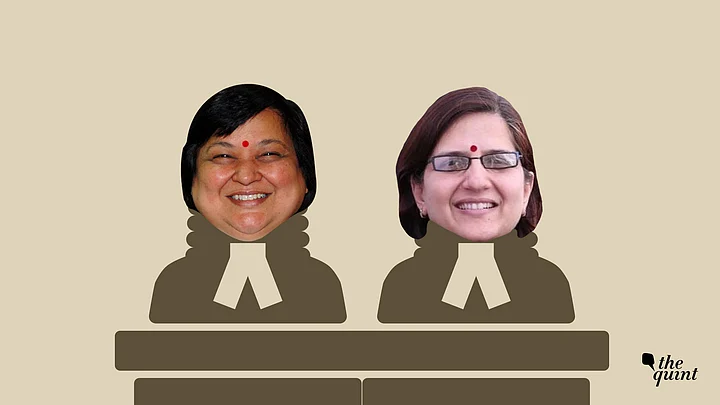In its 90-year-long history, the Jammu and Kashmir High Court is set to get its first woman judge, as well as the first woman Chief Justice this month.
According to a notification issued by Department of Justice of the Union Ministry of Law and Justice on Friday, President has appointed retired Principal and District Judge Srinagar, Rashid Ali Dar, and Assistant Solicitor Genera, Sindhu Sharma, as judges for the J&K High Court. Ms Sharma is from Jammu and Mr Dar belongs to Budgam district of Kashmir valley.
As against the sanctioned strength of 17 judges, including the CJ, the J&K High Court currently had only eight judges.
Forty-six-year-old lawyer daughter of a retired judge of J&K High Court, O.P. Sharma, Sindhu Sharma has acquired the distinction of becoming the first woman judge of the same High Court. It was established in the year 1928 by then Maharaja of Jammu and Kashmir, Hari Singh, as High Court of Judicature. In its 90-year-long existence, none of the 107 judges and CJs of the J&K High Court has been a woman.
History of the J&K High Court
Prior to the establishment of High Court of Judicature, the Maharaja used to be the final authority in administration of justice. In 1889, the British Government asked Maharaja Partap Singh to appoint a Judicial Council that would exercise appellate powers both on civil and criminal side.
Subsequently, the Council was abolished and a Minister was designated as Judge of the High Court to decide judicial cases. In March 1928, the High Court of Judicature, comprising two judges and a CJ, was established by the Dogra monarchy.
On 10 September 1943, Letters Patent was conferred on the J&K High Court. In 1954, vide Constitution Application Order, the jurisdiction of the Supreme Court of India was extended to the State of J&K. Under Article 32 (2-A) of the Constitution of India, the State High Court was for the first time given power to issue writs for enforcement of the fundamental rights so far as they are applicable to the State of J&K.
In 1957, by the Jammu and Kashmir Constitution Act, an independent judicial body with the High Court of Judicature at the top was created by Prime Minister Bakhshi Ghulam Mohammad’s government.
Shattering the Glass Ceiling
Although many women lawyers earned professional respect while practising at the J&K High Court, none of them was ever appointed as a judge for the State High Court. The list of illustrious women lawyers includes Shaista Hakeem, Surinder Kaur, former union Home Secretary Anil Goswami’s wife Neeru Goswami, former Director General of Police M.M. Khajuria’s daughter Seema Shekhar, and former Public Service Commission chairman Shamsuddin Ganai’s daughter Zainab Shams Watali,
In recent past, judges like Gaus-un-Nissa Jeelani and former Chief Secretary Iqbal Khanday’s wife, Kaneez Fatima, reached the rank of Principal District & Session’s Judge and Registrar General.
Sindhu Sharma, a law graduate from Punjab University, in 2014 was the first woman advocate to be appointed as ASG in J&K. In 2017, she was granted a three-year extension on the same position. Daughter of a retired High Court judge from distant Bhaderwah area, Sharma also happens to be a relative of Union Minister Arun Jaitley. In 2013, she was also elected as Vice President of Jammu and Kashmir High Court Bar Association in Jammu.
Justice Geeta Mittal as the Chief Justice
Meanwhile, the acting CJ of Delhi High Court, Justice Gita Mittal, is set to take charge as the first woman Chief Justice of the J&K High Court. The CJ’s chair in J&K has been vacant after Badar Durrez Ahmad’s retirement in March.
Gita Mittal was called to Bench of the Delhi High Court as an Additional Judge in July, 2004, and confirmed as a permanent judge in 2006. She has written extensively on ‘Access to Justice’; protection of human rights; impact of incarceration on women; corporate social responsibility; death penalty; impact of religion, culture, tradition on judging; corporate laws; procedure and intellectual property litigation and environmental laws and issues.
Justice JS Verma Committee report to suggest amendments in criminal law, in the aftermath of the infamous Nirbhaya gang rape episode of 2012, has extensively benefited from the pronouncement in Virender v. State authored by Justice Mittal. In 2018, President Ram Nath Kovind conferred on her Nari Shakti Puruskar, India's highest civilian honour for women.
Justice Mittal is presently chairing the court committees on the Delhi High Court’s Mediation and Conciliation Centre as well as the committee monitoring the Implementation of Judicial Guidelines for Dealing with Cases of Sexual Offences and Child Witnesses. She has spearheaded the Vulnerable Witness Court Project in the trial courts in Delhi. This culminated into the first such court-room in India being inaugurated on 16th September, 2012 and the second on 11th September, 2013.
Deeply engaged with the work of institutional strengthening, Justice Mittal has also served as a member of the Committee Against Sexual Harassment of Women at Work Place; Working Conditions and Welfare Committee For Judicial Officers/Staff of High Court and District Courts among others.
(The writer is a Srinagar-based journalist. He can be reached@ahmedalifayyaz. This is an opinion piece and the views expressed above are the author’s own. The Quint neither endorses nor is responsible for the same)
